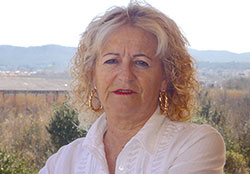Spain: Teresa Capell Torras

Teresa Capell Torras
Health experience related to: arthritis
Early diagnosis and timely treatment of illness relieve anxiety and physical suffering for patients, while personalized case management leads to increased trust in providers and in the health system.
I have been living with arthritis for the last 5 years. It all began when one day I found myself unable to walk. I got to the emergency department of my local hospital where the attending physician told me he could not determine the cause of my pain and that I had to do further testing. He referred me to another hospital for a magnetic resonance imaging (MRI) and a bone scintigraphy – a type of bone scan – then bandaged my knee and sent me home. I had to wait a whole month in this condition, which was very painful and stressful, before I could be seen for tests.
As I learned afterwards, neither the MRI nor the bone scan were particularly useful for diagnosing my arthritis. When I went back with the test results to the hospital, the treating rheumatologist and the head of the rheumatology unit said they still could not determine a diagnosis based on those results. A third rheumatologist was called in, who suggested that we do an ultrasound scan, which immediately identified that I had an outbreak of arthritis.
Despite the delay in diagnosing my illness, I was pleased with the way the physician treated me, because he seemed genuinely interested in my condition and sent me to do other tests that he believed were necessary.
I understand that if the hospital where I received first aid does not have the infrastructure to perform the tests that I needed, then I had to go to another one. The problem was that the other hospital was 50 km away from where we live, and my husband had to take unpaid time off work to drive me there.
A month after receiving my diagnosis, we discovered that the arthritis had moved to my hands. The arthritis affects different parts of my body. Sometimes I have pain in my hands, other times in my feet or knees. At the moment I have arthritis in my shoulders. I go for follow-up once every 6 months and everything is perfect. I get blood tests, ultrasound scans and x-rays done to make sure that the disease has not spread to the bones.
Since I received the diagnosis, the doctor explains everything to me about the disease and the prognosis. She knows that I don't like to take medication, partly because I have problems with my liver. She agrees that I can take the medication only when my arthritis flares up. She also knows which medications I can tolerate and which I can't, so she says to me, "Teresa, take what you need when you have acute symptoms and if there is any problem, call me." I am thankful that if I have an arthritis outbreak, which is highly painful, I have my doctor's number where I can reach her right away, explain what is wrong and get her advice on what to do.
Once she prescribed to me a new drug that had recently come on the market. When I got home and read the contraindications, I called her to say that I was worried about taking it. She said that if I would be taking this medication in fear, it would be better not to take it.
Because arthritis is a disease for life, I think there should be treatments based on complementary medicine. In my case if I take too much cortisone, it can affect my liver. There has to be an alternative.
When I go for my next follow-up visit, I will ask the doctor about the possibility to refer me to physiotherapy services, which may be covered by the social security system. At the moment if I were to use such services, I would have to pay for them myself, but that is very expensive and I cannot afford it.



